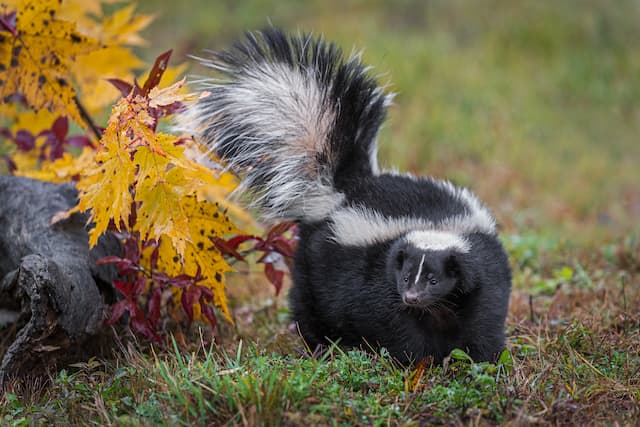In the ever-changing choreography of urban wildlife, skunks occasionally steal the show with a performance that literally leaves its imprint in your yard. These tiny, nocturnal creatures, known for their distinct appearance and pungent spray, can also leave behind a path of destruction on your lawn. As we delve deeper into the topic of skunk-caused lawn damage, we uncover effective methods for restoring the attractiveness and health of your outdoor space.
Identifying the Offender: Skunks’ Role in Lawn Destruction
Skunks are adept foragers, and their search for sustenance frequently brings them to your yard. Skunks, whose diet consists of insects, grubs, and small rodents, have a penchant for digging up lawns in quest of these underground treats. Their distinctive digging pattern — small, conical craters with loose soil — is an indication of their presence and their aesthetic impact on your lawn.
The Ripple Effect: Beyond Aesthetic Lawn Damage
The repercussions of skunks’ burrowing exploits go beyond mere aesthetics. As they uncover grubs and insects, they disrupt the delicate ecological equilibrium of your lawn. This disruption can result in uneven terrain, weakened vegetation, and increased susceptibility to disease. If left unchecked, skunk-caused lawn damage can transform your verdant expanse into a chaotic patchwork.
Effective Solutions for Skunk-Induced Lawn Destruction
Dealing with skunk-caused lawn damage requires a multifaceted strategy that addresses both the underlying causes and the visible effects. You can minimize the impact of skunks on the health of your yard through a combination of preventative measures and strategic interventions.
Since grubs and insects are skunks’ primary food source, employing grub control measures can reduce their food source and discourage their presence. Nematodes, beneficial nematode worms, and other organic treatments can assist in controlling grub populations.
- Installing a barrier around potential entry points can prevent skunks from entering your yard. To prevent burrowing, fencing should be buried a few inches below the surface, and it should be tall enough to discourage skunks from climbing over.
- Motion-Activated Lights and Sprinklers: Skunks are nocturnal animals, and well-lit environments deter their activity. Motion-activated lights and irrigation can deter skunks from entering your yard by frightening them.
- Natural Repellents Natural repellents, such as citrus peels, cayenne pepper, and predator scent, can create an environment that skunks avoid.
In cases of persistent skunk presence and extensive lawn damage, skunk removal professionals are a viable option. These specialists employ humane removal methods and can assist with addressing the issue’s root causes.
A Balanced Relationship: Coexistence in Urban Landscapes
Taking action against skunk-caused lawn damage represents a commitment to coexistence in the urban landscape. As environmental stewards, we seek solutions that respect the roles each species performs while preserving the sanctity of our outdoor areas. By implementing effective strategies and finding common ground with skunks, we can successfully navigate the delicate dance between nature and civilization, ensuring that our yards remain thriving habitats for both humans and wildlife.
Contact us for more information about our humane Skunk Removal Oshawa services. Call us today on 647-694-3620 to book an appointment.
